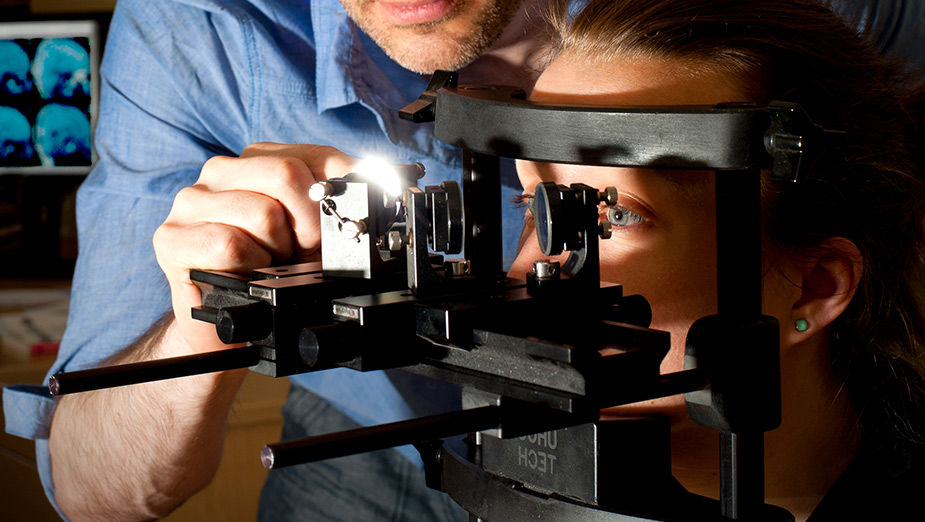Key information
- Duration:
- 3 years full time
- Typical A-level offer:
- AAB
View full entry requirements - UCAS code:
- CB81
- Start date:
- September 2025
- =10th in the UK for Psychology (ShanghaiRanking Global Ranking of Academic Subjects 2023)
- Top 20 in the UK for our research overall in Psychology, Psychiatry and Neuroscience in REF 2021 (Times Higher Education)
- 94% of our research overall in Biological Sciences was assessed to be world leading or internationally excellent (REF 2021)
Study in one of the largest schools of psychology in the UK and tailor your course to your interests, choosing from our extensive range of modules. Whatever your area of interest – clinical, child development, cognitive, forensic, health, social and applied psychology or neuroscience – you'll be supported by our expert staff throughout your degree.
Our course provides a multidisciplinary approach to understanding the relationship between the mind and the brain. It is jointly taught by neuroscientists and psychologists.
You’ll enjoy some of the most advanced research facilities for studying psychology anywhere in the country. These include a child development research suite and a human psychophysiology laboratory.
Accreditation
- Accredited against the requirements for the Graduate Basis for Chartered Membership (GBC) of the British Psychological Society (BPS). Find out more
We understand that deciding where and what to study is a very important decision. We’ll make all reasonable efforts to provide you with the courses, services and facilities described in this prospectus. However, if we need to make material changes, for example due to government or regulatory requirements, or unanticipated staff changes, we’ll let you know as soon as possible.
Studying at Sussex is really exciting. Lecturers are involved in their own research, which brings the theories to life.”Rosalie Considine-Moore
Psychology with Neuroscience BSc
Open Days and virtual visits
Meet us on campus or online
Entry requirements
A-level
| Typical offer | AAB |
|---|---|
| Contextual offer | View contextual offer Not everyone has the same support to get to higher education – we help you reach your potential. When we receive applications through UCAS, we consider all factors and will sometimes make contextual offers as part of our Access and Participation Plan |
| GCSEs | You must have GCSE (or equivalent) Mathematics, with at least grade 4 (or grade C). You should also have a broad range of GCSEs 9-4 (A*-C), including good grades in relevant subjects. |
| Extended Project Qualification | We take the EPQ into account when considering your application and it can be useful in the summer when your results are released if you have narrowly missed the conditions of your offer. We do not routinely include the EPQ in the conditions of your offer but we sometimes offer alternative conditions that include the EPQ. If you wish to discuss this further please contact us |
Other UK qualifications
Access to HE Diploma
| Typical offer | Pass Diploma with at least 39 level 3 credits at Merit or above including 27 credits at Distinction |
|---|---|
| Contextual offer | View contextual offer Not everyone has the same support to get to higher education – we help you reach your potential. When we receive applications through UCAS, we consider all factors and will sometimes make contextual offers as part of our Access and Participation Plan |
| Subjects | The Access course should contain Psychology or be in Science or Social Science. |
| GCSEs | You must have GCSE (or equivalent) Mathematics, with at least grade 4 (grade C).
|
Cambridge Pre-U Principal Subjects (including A-level mixes)
| Typical offer | M1, M1 and M2 in the Pre-U If you have one A-level and two Cambridge Pre-U Principle Subjects, we would expect you to have a grade B in the A-level and M1 and M1 in the two Pre-Us. If you have two A-levels and a Cambridge Pre-U Principle Subject, we would normally expect you to have grades AB in the two A-levels and M1 in the Pre-U. |
|---|---|
| GCSEs | You must have GCSE (or equivalent) Mathematics, with at least grade 4 (grade C). You should also have a broad range of GCSEs grade 9-4 (A*-C), including good grades in relevant subjects. |
International Baccalaureate
| Typical offer | 34 points overall from the full IB Diploma. |
|---|
Pearson BTEC Level 3 National Diploma and one A-level
| Typical offer | Grade B at A-level and Distinction, Distinction in Pearson BTEC Level 3 National Diploma.
|
|---|---|
| Contextual offer | View contextual offer Not everyone has the same support to get to higher education – we help you reach your potential. When we receive applications through UCAS, we consider all factors and will sometimes make contextual offers as part of our Access and Participation Plan |
| GCSEs | You must have GCSE (or equivalent) Mathematics, with at least grade 4 (grade C). You should also have a broad range of GCSEs 9-4 (A*-C), including good grades in relevant subjects. |
Pearson BTEC Level 3 National Extended Certificate and two A-levels
| Typical offer | Grades AB in two A-levels plus Distinction in BTEC Level 3 National Extended Certificate. |
|---|---|
| Contextual offer | View contextual offer Not everyone has the same support to get to higher education – we help you reach your potential. When we receive applications through UCAS, we consider all factors and will sometimes make contextual offers as part of our Access and Participation Plan |
| GCSEs | You must have GCSE (or equivalent) Mathematics, with at least grade 4 (grade C). You should also have a broad range of GCSEs 9-4 (A*-C), including good grades in relevant subjects. |
Pearson BTEC Level 3 National Extended Diploma (formerly BTEC Level 3 Extended Diploma)
| Typical offer | DDD |
|---|---|
| Contextual offer | View contextual offer Not everyone has the same support to get to higher education – we help you reach your potential. When we receive applications through UCAS, we consider all factors and will sometimes make contextual offers as part of our Access and Participation Plan |
| Subjects | Applied Science or Health and Social Care. |
| GCSEs | You must have GCSE (or equivalent) Mathematics, with at least grade 4 (grade C). You should also have a broad range of GCSEs grade 9-4 (A*-C), including good grades in relevant subjects. |
Scottish Highers
| Typical offer | AAABB |
|---|---|
| GCSEs | You will need Scottish National 5 in Mathematics at grade B |
Welsh Baccalaureate Advanced
| Typical offer | AAB from the Advanced Welsh Baccalaureate Skills Challenge Certificate and two A-levels
|
|---|---|
| Contextual offer | View contextual offer Not everyone has the same support to get to higher education – we help you reach your potential. When we receive applications through UCAS, we consider all factors and will sometimes make contextual offers as part of our Access and Participation Plan |
| GCSEs | You must have GCSE (or equivalent) Mathematics, with at least grade 4 (grade C). You should also have a broad range of GCSEs grade A*-C (9-4), including good grades in relevant subjects. |
International Baccalaureate
| Typical offer | 34 points overall from the full IB Diploma. |
|---|
European Baccalaureate
| Typical offer | Overall result of at least 80% |
|---|---|
| Additional requirements | You must have a good level of Mathematics. |
Other international qualifications
Australia
| Typical offer | Relevant state (Year 12) High School Certificate, and 92% in the ATAR or UAI/TER/ENTER, or a Queensland OP of 4 or better. |
|---|---|
| Additional requirements | You must have a good level of Mathematics. Our entry requirements are guidelines and we assess all applications on a case-by-case basis. |
Austria
| Typical offer | Reifeprüfung or Matura with an overall result of 1.8 or better for first-year entry. |
|---|---|
| Additional requirements | You must have a good level of Mathematics. Our entry requirements are guidelines and we assess all applications on a case-by-case basis. |
Belgium
| Typical offer | Certificat d'Enseignement Secondaire Supérieur (CESS) or Diploma van Hoger Secundair Onderwijs with a good overall average. |
|---|---|
| Additional requirements | You must have a good level of Mathematics. Our entry requirements are guidelines and we assess all applications on a case-by-case basis. |
Bulgaria
| Typical offer | Diploma za Sredno Obrazovanie with excellent final-year scores (normally 5.5 overall with 6 in key subjects). |
|---|---|
| Additional requirements | You must have a good level of Mathematics. Our entry requirements are guidelines and we assess all applications on a case-by-case basis |
Canada
| Typical offer | Ontario Secondary School Diploma (OSSD) 75% from 6 grade 12 U, U/C or M courses. British Columbia Certificate of Graduation AAABB from 5 grade 12 courses. We also recognise the High School Diploma from other provinces -including Alberta, Manitoba, New Brunswick- where we look for strong performance in grade 12 subjects, and the Diplome d'Etudes Collegiales (DEC) from Quebec. |
|---|---|
| Additional requirements | You must have a good level of Mathematics. Our entry requirements are guidelines and we assess all applications on a case-by-case basis. |
China
| Typical offer | If you have the Goakao, we will consider applications for direct entry to first year. You would normally need an overall average of 75%, including required subjects. We are also pleased to consider applications if you are following a recognised International Foundation Year or you have one or more years of Higher Education in China at a recognised degree awarding institution. The Senior High School Graduation alone would not be sufficient for entry to our undergraduate degrees, but you may be eligible to apply for our International Foundation Year. If you successfully complete an International Foundation Year, you can progress on to a relevant undergraduate course at Sussex. Check which qualifications the International Study Centre accepts for the International Foundation Year. |
|---|---|
| Additional requirements | You must have a good level of Mathematics. Our entry requirements are guidelines and we assess all applications on a case-by-case basis. |
Croatia
| Typical offer | Maturatna Svjedodžba with an overall score of 4.5 |
|---|---|
| Additional requirements | You must have a good level of Mathematics. Our entry requirements are guidelines and we assess all applications on a case-by-case basis. |
Cyprus
| Typical offer | Apolytirion of Lykeion with an overall average 19/20 and above. |
|---|---|
| Additional requirements | You must have a good level of Mathematics. Our entry requirements are guidelines and we assess all applications on a case-by-case basis. |
Czech Republic
| Typical offer | Maturita with a good overall average. |
|---|---|
| Additional requirements | You must have a good level of Mathematics. Our entry requirements are guidelines and we assess all applications on a case-by-case basis. |
Denmark
| Typical offer | Højere Forberedelseseksamen (HF) or Studentereksamen with an overall average of at least 7 on the new grading scale. |
|---|---|
| Additional requirements | You must have a good level of Mathematics. Our entry requirements are guidelines and we assess all applications on a case-by-case basis. |
Finland
| Typical offer | Pass Ylioppilastutkinto with overall final result between EEMM |
|---|---|
| Additional requirements | You must have a good level of Mathematics. Our entry requirements are guidelines and we assess all applications on a case-by-case basis. |
France
| Typical offer | French Baccalauréat with overall final result of 14/20. |
|---|---|
| Additional requirements | You must have a good level of Mathematics. Our entry requirements are guidelines and we assess all applications on a case-by-case basis. |
Germany
| Typical offer | German Abitur with an overall result of 1.8 or better. |
|---|---|
| Additional requirements | You must have a good level of Mathematics. Our entry requirements are guidelines and we assess all applications on a case-by-case basis. |
Greece
| Typical offer | Apolytirion with an overall average of 19/20 will be considered for first-year entry. |
|---|---|
| Additional requirements | You must have a good level of Mathematics. Our entry requirements are guidelines and we assess all applications on a case-by-case basis. |
Hong Kong
| Typical offer | Hong Kong Diploma of Secondary Education (HKDSE) with grades of 5, 5, 4 from three subjects including two electives.
|
|---|---|
| Additional requirements | You must have a good level of Mathematics; you will need a score of 3 in Core Mathematics. Our entry requirements are guidelines and we assess all applications on a case-by-case basis. |
Hungary
| Typical offer | Erettsegi/Matura with a good average of at least 55544 |
|---|---|
| Additional requirements | You must have a good level of Mathematics. Our entry requirements are guidelines and we assess all applications on a case-by-case basis. |
India
| Typical offer | Standard XII results 85% from ISC Indian School certificate of Education (CISCE)
|
|---|---|
| Additional requirements | You must have a good level of Mathematics. Our entry requirements are guidelines and we assess all applications on a case-by-case basis. |
Iran
| Typical offer | Where direct entry is unsuitable, we'll automatically consider you for one of our Foundation Years. Or you might want to apply to one of our International Foundation Years at the international Study Centre on Campus. Visit isc.sussex.ac.uk/our-courses/international-foundation-year or www.sussex.ac.uk/study/undergraduate/courses/foundation-years |
|---|---|
| Subject-specific knowledge | You must have a good level of Mathematics. Our entry requirements are guidelines and we assess all applications on a case-by-case basis. |
| Please note | Our entry requirements are guidelines and we assess all applications on a case-by-case basis. |
Ireland
| Typical offer | Irish Leaving Certificate (Higher Level) at H1,H1,H2,H2,H3 |
|---|---|
| Additional requirements | You must have at least grade O3 in Mathematics. Our entry requirements are guidelines and we assess all applications on a case-by-case basis. |
Israel
| Typical offer | For first year entry at least 80% (or 8/10) in at least 6 subjects, including one 5 unit subject, in one sitting of the Bagrut. |
|---|---|
| Additional requirements | You must have a good level of Mathematics. Our entry requirements are guidelines and we assess all applications on a case-by-case basis. |
Italy
| Typical offer | Italian Diploma Di Maturità or Diploma Pass Di Esame Di Stato with a final Diploma mark of 85/100. |
|---|---|
| Additional requirements | You must have a good level of Mathematics. Our entry requirements are guidelines and we assess all applications on a case-by-case basis. |
Japan
| Typical offer | Where direct entry is unsuitable, we'll automatically consider you for one of our Foundation Years. Or you might want to apply to one of our International Foundation Years at the international Study Centre on Campus. Visit isc.sussex.ac.uk/our-courses/international-foundation-year or www.sussex.ac.uk/study/undergraduate/courses/foundation-years |
|---|---|
| Subject-specific knowledge | You must have a good level of Mathematics. Our entry requirements are guidelines and we assess all applications on a case-by-case basis. |
| Please note | Our entry requirements are guidelines and we assess all applications on a case-by-case basis. |
Latvia
| Typical offer | Atestats par Visparejo videjo Izglitibu with very good grades in state exams. |
|---|---|
| Additional requirements | You must have a good level of Mathematics. Our entry requirements are guidelines and we assess all applications on a case-by-case basis. |
Lithuania
| Typical offer | Brandos Atestatas including scores of 80-90% in at least three state examinations (other than English). |
|---|---|
| Additional requirements | You must have a good level of Mathematics. Our entry requirements are guidelines and we assess all applications on a case-by-case basis. |
Luxembourg
| Typical offer | Pass the Diplome de Fin d’Etudes Secondaires with 48 points overall. |
|---|---|
| Additional requirements | You must have a good level of Mathematics. Our entry requirements are guidelines and we assess all applications on a case-by-case basis. |
Malaysia
| Typical offer | Sijil Tinggi Persekolahan Malaysia (STPM) with grades of ABB- AAB, Matriculation with a least a grade of 3.5 or UEC with an overall average grade A2,A2,B3,B3,B3,B3 ( or average 77%). |
|---|---|
| Additional requirements | You must have a good level of Mathematics. Our entry requirements are guidelines and we assess all applications on a case-by-case basis. |
Netherlands
| Typical offer | Voorereidend Wetenschappelijk Onderwijs (VWO), normally with an average between 7-8. |
|---|---|
| Additional requirements | You must have a good level of Mathematics. Our entry requirements are guidelines and we assess all applications on a case-by-case basis. |
Nigeria
| Typical offer | You are expected to have one of the following:
You must also have a score of C6 or above in WAEC/SSC English. Where direct entry is unsuitable, we'll automatically consider you for one of our Foundation Years. Or you might want to apply to one of our International Foundation Years at the international Study Centre on Campus. Visit isc.sussex.ac.uk/our-courses/international-foundation-year or www.sussex.ac.uk/study/undergraduate/courses/foundation-years |
|---|---|
| Additional requirements | You must have a good level of Mathematics. Our entry requirements are guidelines and we assess all applications on a case-by-case basis. |
Norway
| Typical offer | Norwegian Vitnemal Fra Den Videregaende Opplaering - Pass with an overall average of 4.5 |
|---|---|
| Additional requirements | You must have a good level of Mathematics. Our entry requirements are guidelines and we assess all applications on a case-by-case basis. |
Pakistan
| Typical offer | You can apply for direct entry to Year 1 if you are completing at least two years of Bachelor degree studies. You'll normally need to complete a Foundation year after taking Intermediate Certificate or the Higher Secondary Certificate (HSC). You might choose one of our International Foundation Years at the International Study Centre on campus. |
|---|---|
| Additional requirements | You must have a good level of Mathematics. Our entry requirements are guidelines and we assess all applications on a case-by-case basis. |
Poland
| Typical offer | Pass Matura with least 3 Extended level subjects in the 80th percentile.
|
|---|---|
| Additional requirements | You must have a good level of Mathematics. Please note: Our entry requirements are guidelines and we assess all applications on a case-by-case basis. |
Portugal
| Typical offer | Diploma de Ensino Secundario normally with an overall mark of 18/20. |
|---|---|
| Additional requirements | You must have a good level of Mathematics. Our entry requirements are guidelines and we assess all applications on a case-by-case basis. |
Romania
| Typical offer | Diploma de Bacalaureat with an overall average of 8.7 |
|---|---|
| Additional requirements | You must have a good level of Mathematics. Our entry requirements are guidelines and we assess all applications on a case-by-case basis. |
Russia
| Typical offer | Applicants who have good grades in the Attestat o Srednem Obrazovami (Certificate of Secondary Education) and who have successfully completed the first year of a Russian University degree, with a minimum GPA of 4.0, will be considered for admission to the first year of our bachelor’s degree courses. |
|---|---|
| Subject-specific knowledge | You must have a good level of Mathematics. Our entry requirements are guidelines and we assess all applications on a case-by-case basis. |
| Please note | Our entry requirements are guidelines and we assess all applications on a case-by-case basis. |
Singapore
| Typical offer | A-levels, as well as certain certificates and diplomas. |
|---|---|
| Additional requirements | You must have a good level of Mathematics. Our entry requirements are guidelines and we assess all applications on a case-by-case basis. |
Slovakia
| Typical offer | Pass Vysvedčenie o maturitnej skúške (Maturita) with an average above 1.5 from 4 subjects.
|
|---|---|
| Additional requirements | You must have a good level of Mathematics. Please note: Our entry requirements are guidelines and we assess all applications on a case-by-case basis. |
Slovenia
| Typical offer | Secondary School Leaving Diploma or Matura with at least 24 points overall. |
|---|---|
| Additional requirements | You must have a good level of Mathematics. Our entry requirements are guidelines and we assess all applications on a case-by-case basis. |
South Africa
| Typical offer | National Senior Certificate with very good grades. |
|---|---|
| Additional requirements | You must have a good level of Mathematics. Our entry requirements are guidelines and we assess all applications on a case-by-case basis. |
Spain
| Typical offer | Spanish Título de Bachillerato (LOGSE) with an overall average result of at least 8.0. |
|---|---|
| Additional requirements | You must have a good level of Mathematics. Our entry requirements are guidelines and we assess all applications on a case-by-case basis. |
Sri Lanka
| Typical offer | Sri Lankan A-levels. |
|---|---|
| Additional requirements | You must have a good level of Mathematics. Our entry requirements are guidelines and we assess all applications on a case-by-case basis. |
Sweden
| Typical offer | Fullstandigt Slutbetyg/Högskoleförberedande Examen with a total of 2,500 credits to include B grades in the majority of subjects. |
|---|---|
| Additional requirements | You must have a good level of Mathematics. Our entry requirements are guidelines and we assess all applications on a case-by-case basis. |
Switzerland
| Typical offer | Federal Maturity Certificate.
|
|---|---|
| Additional requirements | You must have a good level of Mathematics. Our entry requirements are guidelines and we assess all applications on a case-by-case basis. |
Turkey
| Typical offer | We'll consider students who have taken the Lise Diplomasi or Lise Bitirme, with a score of at least 4/5 or 80/100 in their final year, on a case by case basis for direct entry to year 1. Where direct entry is unsuitable, we'll automatically consider you for one of our Foundation Years. Or you might want to apply to one of our International Foundation Years at the international Study Centre on Campus. Visit isc.sussex.ac.uk/our-courses/international-foundation-year or www.sussex.ac.uk/study/undergraduate/courses/foundation-years |
|---|---|
| Additional requirements | You must have a good level of Mathematics. Our entry requirements are guidelines and we assess all applications on a case-by-case basis. |
USA
| Typical offer | We look at your full profile taking into account everything you are studying, including the high school graduation diploma, Grade 12 GPA, SAT tests and/or ACT grades We are particularly interested in AP tests and would ideally like to see three good AP scores. Advanced Placement Tests with scores of 5, 5, 4 from three subjects. If you have taken the SAT reasoning tests we'd normally expect a combined score of at least 1300. If you've taken the ACT we'd expect to see a composite score of at least 26.
|
|---|---|
| Additional requirements | You must have a good level of Mathematics. Our entry requirements are guidelines and we assess all applications on a case-by-case basis. |
My country is not listed
If your qualifications aren’t listed or you have a question about entry requirements, contact us
English language requirements
IELTS (Academic)
6.0 overall, including at least 5.5 in each component
Check your IELTS qualification meets all of our language requirements
IELTS scores are valid for two years from the test date. You cannot combine scores from more than one sitting of the test. Your score must be valid when you begin your Sussex course.
We accept IELTS One Skills Retake.
We do not accept IELTS Online.
Other English language requirements
Proficiency tests
Cambridge Advanced Certificate in English (CAE)
169 overall, including at least 162 in each skill
Find out more about Cambridge English: Advanced.
We would normally expect the CAE test to have been taken within two years before the start of your course.
You cannot combine scores from more than one sitting of the test.
Cambridge Certificate of Proficiency in English (CPE)
169 overall, including at least 162 in each skill
Find out more about Cambridge English: Proficiency.
We would normally expect the CPE test to have been taken within two years before the start of your course.
You cannot combine scores from more than one sitting of the test.
Pearson (PTE Academic)
59 overall, including at least 59 in all four skills.
Check your Pearson (PTE Academic) qualification meets all of our language requirements
Find out more about Pearson (PTE Academic).
Please refer to our English language requirements above, and as listed for each of our undergraduate courses, to find the appropriate English level for the course you are applying for.
PTE (Academic) scores are valid for two years from the test date. You cannot combine scores from more than one sitting of the test. Your score must be valid when you begin your Sussex course.
We do not accept the PTE Academic Online test.
TOEFL (iBT)
80 overall, including at least 17 in Listening, 18 in Reading, 20 in Speaking, 17 in Writing.
Check your TOEFL qualification meets all of our language requirements
Find out more about TOEFL (iBT).
TOEFL (iBT) scores are valid for two years from the test date. You cannot combine scores from more than one sitting of the test. Your score must be valid when you begin your Sussex course.
We do not accept TOEFL (iBT) Home Edition.
The TOEFL Institution Code for the University of Sussex is 9166.
English language qualifications
AS/A-level (GCE)
Grade C or above in English Language.
Hong Kong Advanced Level Examination (HKALE)/ AS or A Level: grade C or above in Use of English
GCE O-level
Grade C or above in English.
Brunei/Cambridge GCE O-level in English: grades 1-6.
Singapore/Cambridge GCE O-level in English: grades 1-6.
GCSE or IGCSE
Grade C or above in English as a First Language (grade 4 or above in GCSE from 2017).
Grade B or above in English as a Second Language
Ghana Senior Secondary School Certificate
If awarded before 1993: grades 1-6 in English language.
If awarded between 1993 and 2005: grades A-D in English language.
Hong Kong Diploma of Secondary Education (HKDSE)
Level 4, including at least 3 in each component in English Language.
Indian School Certificate (Standard XII)
The Indian School Certificate is accepted at the grades below when awarded by the following examination boards:
Central Board of Secondary Education (CBSE) – English Core only: 70%
Council for Indian School Certificate Examinations (CISCE) - English: 70% or Grade 3
International Baccalaureate Diploma (IB)
English A or English B at grade 5 or above.
Kenya Certificate of Secondary Education
Grades A – C in English
Malaysian Certificate of Education (SPM) 119/GCE O-level
If taken before the end of 2008: grades 1-5 in English Language.
If taken from 2009 onwards: grade C or above in English Language.
The qualification must be jointly awarded by the University of Cambridge Local Examinations Syndicate (UCLES).
West African Senior School Certificate
Grades 1-6 in English language when awarded by the West African Examinations Council (WAEC) or the National Examinations Council (NECO).
Country exceptions
Select to see the list of exempt English-speaking countries
If you are a national of one of the countries below, or if you have recently completed a qualification equivalent to a UK Bachelors degree or higher in one of these countries, you will normally meet our English requirements. Note that qualifications obtained by distance learning or awarded by studying outside these countries cannot be accepted for English language purposes.
You will normally be expected to have completed the qualification within two years before starting your course at Sussex. If the qualification was obtained earlier than this we would expect you to be able to demonstrate that you have maintained a good level of English, for example by living in an English-speaking country or working in an occupation that required you to use English regularly and to a high level.
Please note that this list is determined by the UK’s Home Office, not by the University of Sussex.
List of exempt countries
- Antigua and Barbuda
- Australia
- Bahamas
- Barbados
- Belize
- Canada**
- Dominica
- Grenada
- Guyana
- Ireland
- Jamaica
- New Zealand
- St Kitts and Nevis
- St Lucia
- St Vincent and the Grenadines
- Trinidad and Tobago
- United Kingdom
- USA
** Canada: you must be a national of Canada; other nationals not on this list who have a degree from a Canadian institution will not normally be exempt from needing to provide evidence of English.
Admissions information for applicants
| Transfers into Year 2 | No |
|---|
If your qualifications aren’t listed or you have a question about entry requirements, contact us
For details on any additional costs, check out the Fees and scholarships section.
Don’t meet our entry requirements?
If you don't meet our entry requirements, we recommend our in-house Foundation Year course to prepare you for Year 1 of your chosen degree:
If you don't have the required language skills for this course you could consider the International Study Centre. The ISC offers a range of foundation courses in combination with English language teaching.
Modules
This is a major/minor course, enabling you to study in depth in a core area (your major subject: taking up 75% of your time), while also exploring an additional area (your minor subject: taking up 25% of your time).
Find out about our types of undergraduate degrees, their structure, modules and credits
Core modules
Core modules are taken by all students on the course. They give you a solid grounding in your chosen subject and prepare you to explore the topics that interest you most.
- Cognition in Clinical Contexts
- Individuals and Groups
- Physiology and Disease
- Psychology as a science
Autumn teaching
Spring teaching
We regularly review our modules to incorporate student feedback, staff expertise, as well as the latest research and teaching methodology. We’re planning to run these modules in the academic year 2024/25. However, there may be changes to these modules in response to feedback, staff availability, student demand or updates to our curriculum. We’ll make sure to let you know of any material changes to modules at the earliest opportunity.
We’ll do our best to provide as much optional choice as we can, but timetabling constraints mean it may not be possible to take some module combinations. The structure of a small number of courses means that the order of modules or the streams you choose may determine whether modules are core or optional. This means that your core modules or options may differ from what’s shown here.
Check back in January 2025 for more details of the modules running in the academic year 2025/26.
Core modules
Core modules are taken by all students on the course. They give you a solid grounding in your chosen subject and prepare you to explore the topics that interest you most.
- Cognitive Psychology
- Developmental Psychology
- Discovering Statistics
- Principles of Neuronal Function
Autumn teaching
Spring teaching
We regularly review our modules to incorporate student feedback, staff expertise, as well as the latest research and teaching methodology. We’re planning to run these modules in the academic year 2024/25. However, there may be changes to these modules in response to feedback, staff availability, student demand or updates to our curriculum. We’ll make sure to let you know of any material changes to modules at the earliest opportunity.
We’ll do our best to provide as much optional choice as we can, but timetabling constraints mean it may not be possible to take some module combinations. The structure of a small number of courses means that the order of modules or the streams you choose may determine whether modules are core or optional. This means that your core modules or options may differ from what’s shown here.
Check back in January 2025 for more details of the modules running in the academic year 2025/26.
Study abroad (optional)
Apply to study abroad – you’ll develop an international perspective and gain an edge when it comes to your career. Find out where your course could take you
If your application to study abroad is successful, you’ll have to meet the academic requirements at Sussex and also at the partner university. Find out more about studying abroad as a Sussex student
Placement (optional)
To help you gain experience and increase your employability, you can apply for an optional placement as part of your course. You’ll be responsible for applying for and securing your placement. Our dedicated careers team can provide you with information and advice. If you’re successful in obtaining a placement, this will form part of your course.
Find out more about placements and internships
Recent students have gone on placements at institutions including:
- Sussex Partnership NHS Foundation Trust
- Child and Adolescent Mental Health Service (CAMHS)
- The Office for National Statistics.
Please note that if you’re receiving – or applying for – USA federal Direct Loan funds, you can’t transfer to the version of your course with an optional study abroad period in any country or optional placement in the USA if the number of credits for the placement/internship exceeds 25% of the total credits for your course. Find out more about American Student Loans and Federal Student Aid
Core modules
Core modules are taken by all students on the course. They give you a solid grounding in your chosen subject and prepare you to explore the topics that interest you most.
Autumn teaching
Autumn and spring teaching
Spring teaching
Options
Alongside your core modules, you can choose options to broaden your horizons and tailor your course to your interests. This list gives you a flavour of our options, which are kept under review and may change, for example in response to student feedback or the latest research.
While it’s our aim for students to take their preferred combinations of options, this can’t be guaranteed and will be subject to timetabling. Options may be grouped and if so, students will be able to choose a set number of options from the selection available in any particular group.
- Attention: Distraction, Daydreaming and Diversity
- Biological Psychology of Mental Health
- Caring and Helping: the Psychology of Concern and Commitment
- Cognitive Neuroscience
- Depression in Adolescents
- Educational Psychology
- Forensic Psychology
- Health Psychology
- Intelligence in Animals and Machines
- Living Well: Modes of Self-Focus
- Nature and Nurture of Mental Health
- Peer Relationships: From Toddlerhood to Middle Childhood
- Perspectives on Psychology
- Psychological Perspectives on Self and Identity
- Psychology of Appetite
- Psychology of Collective Action
- Psychology of Sleep
- Science of Memory
- Self Regulation: The Science of Achieving Your Goals
- Social Cognitive Development
- Social Connection and Disconnection
- The Psychology of Elite Performance
- Autism Across the Lifespan
- Child Language: Development, Disorders and Individual Differences
- Clinical Psychology in Practice
- Comparative Psychology: The Psychology of Animal Behaviour
- Conflict & Cooperation in Social Groups
- Conscious and Unconscious Mental Processes
- Contemporary Topics in Child Development and Wellbeing
- Manipulating Minds
- Organisational Psychology
- Positive Psychology
- Prejudice, Discrimination and Intergroup Relations
- Psychology and Culture
- Psychology of the Family: Beyond Attachment
Autumn teaching
Spring teaching
We regularly review our modules to incorporate student feedback, staff expertise, as well as the latest research and teaching methodology. We’re planning to run these modules in the academic year 2024/25. However, there may be changes to these modules in response to feedback, staff availability, student demand or updates to our curriculum. We’ll make sure to let you know of any material changes to modules at the earliest opportunity.
We’ll do our best to provide as much optional choice as we can, but timetabling constraints mean it may not be possible to take some module combinations. The structure of a small number of courses means that the order of modules or the streams you choose may determine whether modules are core or optional. This means that your core modules or options may differ from what’s shown here.
Check back in January 2025 for more details of the modules running in the academic year 2025/26.
Find out about studying Psychology at Sussex, including clinical, cognitive, social, health, forensic, neuroscience and child development psychology

Silver
The student experience and student outcomes are typically very high quality.
This rating was awarded in 2023, for four years.
(Teaching Excellence Framework 2023)
Find out more about our approach to teaching and supporting you to thrive
Our staff
Neuroscience







Prof Leon Lagnado
Professor Of Neuroscience 'Royal Society Wolfson Research Merit Award holder'




Psychology













Fees
Fees are not yet set for the academic year 2025/26 – please check back in September 2024. Note that your fees, once they’re set, may be subject to an increase on an annual basis.
Find out about typical living costs for studying at Sussex
Find out about our terms and conditions
Scholarships
Details of our scholarships are not yet set for entry in the academic year 2025/26.
Careers
You’ll develop skills essential for careers in professional psychology or research, including:
- critical thinking
- research and data analysis
- understanding human behaviour.
You can use the neuroscience skills you’ve learned for jobs in the pharmaceutical and biotechnology sectors, or research careers in neuropharmacology and neuropsychology.
Working while you study
Our Careers and Entrepreneurship team can help you find part-time work while you study. Find out more about career development and part-time work
A-level - contextual offer
BCC
Access to HE Diploma - contextual offer
Pass Diploma with at least 39 level 3 credits at Merit or above including 15 credits at Distinction
Pearson BTEC Level 3 National Diploma and one A-level - contextual offer
Grade B at A-level and Merit, Merit in Pearson BTEC Level 3 National Diploma.
Pearson BTEC Level 3 National Extended Certificate and two A-levels - contextual offer
Grades BC in two A-levels plus Distinction in BTEC Level 3 National Extended Certificate.
Pearson BTEC Level 3 National Extended Diploma (formerly BTEC Level 3 Extended Diploma) - contextual offer
DMM
Welsh Baccalaureate Advanced - contextual offer
BCC from the Advanced Welsh Baccalaureate Skills Challenge Certificate and two A-levels
